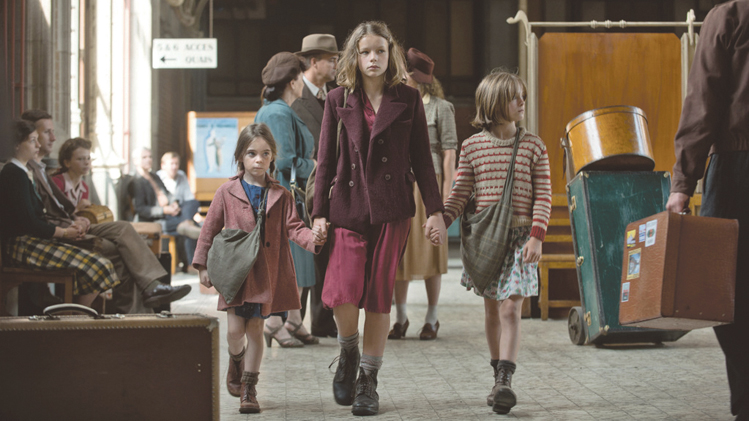A child shall lead them on Fanny’s Journey

Review By Michael Fox, Special To The Dayton Jewish Observer
Movies about Jews evading the Holocaust are, frankly, irresistible. We never tire of these celluloid beacons of hope, not least because we can never forget that the victims greatly outnumbered the escapees.
The challenge that filmmakers face in this area is keeping the rays of light in proportion to the vast darkness of reality. The vivid and moving drama, Fanny’s Journey, succeeds on that score by showing occupied France through the eyes of children who can’t fully apprehend the dangers all around them.
The viewer brings all the context that the titular heroine and her even younger charges lack. We fill in the off-screen horrors, from Paris deportations to labor and death camps in the east, that are only briefly alluded to.
Consequently, the preponderance of bright, sunlit exteriors in Fanny’s Journey feels like a reflection of normal childhood rather than a fake veneer lacquered over grim day-to-day existence. At the same time, every close call and near escape — and the movie abounds with them — is even more fraught for the audience than for the fleeing children.
Fanny’s Journey, adapted by French writer-director Lola Doillon from Fanny Ben-Ami’s 2011 autobiography, opens the 2017 JCC Film Fest.
The movie starts rolling in 1943 at an idyllic country house teeming with children and a few doting adults. Thousands of French Jewish parents brought their kids to rural enclaves like this for safekeeping, hoping to reunite after the Nazis were expelled and the war ended.
 Fanny and her two younger sisters cherish their mother’s letters — their father is in a camp — and Fanny also takes bittersweet comfort in recalling vignettes from the family’s brief period of happiness together.
Fanny and her two younger sisters cherish their mother’s letters — their father is in a camp — and Fanny also takes bittersweet comfort in recalling vignettes from the family’s brief period of happiness together.
The siblings’ security and stability comes to an abrupt end when the staff learns the Nazis have been tipped off to the presence of Jewish children. Quickly loaded onto buses, the kids are dispatched to another safe house on the Italian side of the border.
The no-nonsense Madame Forman (Cécile de France, The Young Pope) rules the roost here, and she has no time or inclination for coddling. She’s unduly harsh, but her manner is both bracing and necessary: From here on, everyone’s survival depends on paying attention and following instructions.
After Madame Forman hears the news of Mussolini’s arrest on the radio, she instantly assesses the consequences: The brutal Germans will now be in charge, not Italian soldiers and police, and Jews are in immediate danger.
Madame Forman and her assistant, a teenager named Eli, manage to board the children on a train headed across France toward the Swiss border, although it requires a desperate, gutsy, spur-of-the-moment, on-the-platform distraction on her part.
She briefly meets up with the children subsequently, by which time Eli has fled. Out of options, Madame Forman puts Fanny in charge of leading the eight other kids to safety. (In actuality, the 13-year-old shepherded an astounding 27 children. The truth would have been too much for moviegoers to accept.)
Fanny’s Journey depicts people helping endangered Jews for a variety of reasons, from love and innate humanity to simple commerce. The entire gamut of responses is evoked, with gratifying understatement: heroism, self-sacrifice, self-interest, indifference and betrayal.
The heart of the film, though, is the children’s response to the disorienting and difficult circumstances which they must continually contend with. The film rarely invokes the paranoid feeling of not knowing whom to trust; rather the viewer understands that Fanny and her charges will have to ultimately save themselves.
Fanny’s Journey smoothly carries off the trick of making the kids vulnerable so that we despise anyone who would torment and threaten them, yet resilient enough to evade and escape their adversaries.
By way of reminding us that the protagonists aren’t action heroes or Jason Bourne-like prodigies, Doillon intersperses her film with interludes when the kids behave like kids — kicking a soccer ball, splashing in a stream, collecting wind-strewn currency in a meadow.
The director generally resists using the score to manipulate our emotions, though she occasionally veers into the broadly sentimental. For the viewer equipped with tissues, it’s not a problem.
Fanny’s Journey is an intelligent, gripping saga that honors the painful Jewish past and calls out French collaborators. If it also puts us in mind of child refugees and immigrants, well, compassion is a universal value.
The JCC Film Fest opens with Fanny’s Journey at 7 p.m. on Tuesday, April 25 at Cinemark at The Greene, with an additional screening at 7 p.m. on Thursday, May 11 at the Little Art Theatre, 247 Xenia Ave, Yellow Springs. Tickets are available at the door, at jewishdayton.org, at the Boonshoft CJCE, 525 Versailles Dr., Centerville, or by calling Karen Steiger at 610-1555.
To read the complete April 2017 Dayton Jewish Observer, click here.

